

We must end the age of exploration subsidies. Somewhere around the halfway point of COP21, Oil Change International (OCI) took a moment to shine a light on fossil fuel subsidies, and revealed that support for non-renewables among the world’s wealthiest nations could derail outstanding commitments to climate finance.
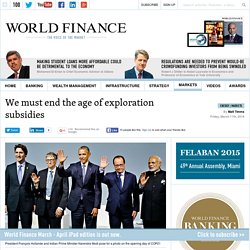
The findings, which took into account spending in the G7 countries and Australia, showed that the combined annual spend on fossil fuel subsidies totals around $88bn. As a means of comparison, support for the Green Climate Fund is around $2bn. Looking at the figures for 2013, the US Government handed out $5.2bn in exploration subsidies, Australia $3.5bn, Russia $2.4bn and the UK $1.2bn, mostly in the form of tax breaks for deep offshore fields. These results feed into a furious debate on the subject of fossil fuel support and whether it compromises the ability of major world governments to act on climate change. For the very same reasons highlighted in the OCI report, fossil fuel subsidies are under fire. Fossil Fuels Are A Terrible Investment, And They're Only Going To Get Worse. Dans les Andes, la croisade d'un paysan péruvien pour défendre les glaciers qui fondent - 9 décembre 2015.
Huaraz (Pérou) (AFP) - Dans un parc naturel péruvien, le clapotis de l'eau qui s'écoule depuis le glacier enneigé du Pastoruri est interrompu par un bruit sourd qui secoue les Andes, celui des blocs de glace qui se détachent à cause du réchauffement climatique.

Saul Luciano Lliuya, 34 ans, connaît parfaitement ce phénomène. Né dans le village de Llupa, zone montagneuse de la région d'Ancash, dans le nord du Pérou, cet agriculteur et guide de haute montagne est le témoin privilégié de la détérioration de ce qu'il considère comme "ses" glaciers andins. 'Un tsunami de défaillances sur dettes va s'abattre sur le monde' - Express [FR] Aux Etats-Unis, faillites en vue dans le secteur pétrolier. LE MONDE ECONOMIE | | Par Stéphane Lauer (New York, correspondant) Jusqu’à quand va se prolonger la partie de poker menteur qui se joue aux Etats-Unis entre les secteurs pétrolier et bancaire ?

Alors que le second a prêté sans compter au premier aux belles heures du boom du pétrole de schiste, l’effondrement des cours du baril a instauré un équilibre instable qui risque à tout moment de se rompre, entraînant des faillites pour les producteurs et de lourdes pertes pour les prêteurs. Malgré un rebond de 4,2 % à 29,53 dollars, jeudi 21 janvier à New York, le pétrole a perdu les trois-quart de sa valeur depuis la mi-2014. Sell everything ahead of stock market crash, say RBS economists. Investors face a “cataclysmic year” where stock markets could fall by up to 20% and oil could slump to $16 a barrel, economists at the Royal Bank of Scotland have warned.

In a note to its clients the bank said: “Sell everything except high quality bonds. This is about return of capital, not return on capital. In a crowded hall, exit doors are small.” It said the current situation was reminiscent of 2008, when the collapse of the Lehman Brothers investment bank led to the global financial crisis. This time China could be the crisis point. Stock markets have already come under severe pressure in 2016, with the FTSE 100 down more than 5% in its worst start since 2000. Oil prices have also fallen sharply on fears of lower demand and a supply glut, especially with Iran due to start exporting once more when sanctions are lifted.
Andrew Roberts, RBS’s credit chief, said: “China has set off a major correction and it is going to snowball. RBS is not the only negative voice at the moment. Laurent Fabius : « Nous devons supprimer les aides aux énergies fossiles » E.ON completes split of fossil fuel and renewable operations. Germany energy giant E.ON has officially separated its fossil fuel assets into a new company, dubbed Uniper.
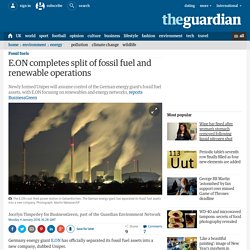
The move, which became effective on January 1st, will see the energy company focus on renewables, energy networks, and energy efficiency services. Meanwhile, the independent Uniper will assume control of the company’s fossil fuel and hydro assets, as well as its global energy trading activity. Johannes Teyssen, chief executive of E.ON, said the move, which was first announced in 2014, would make E.ON and Uniper more “agile” and give each company the best chance of becoming a leader in its own sphere. “This liberates us from continually having to make compromises,” he said in a statement. “Our ambition is for both companies, which soon will be legally independent of one another, to become leading players in their respective energy worlds.” E.ON announced the split a year ago in response to what it described as “dramatically altered global energy markets”.
Terror, climate chaos, financial crisis are the costs of ‘doing business’ Fossil Free France – Zéro Fossile. Money turns green: investing in the future post-Paris - ECIU. By Matt Finch The dust has settled, the delegates have returned home, the journalists have closed their laptops.
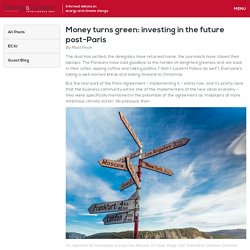
The Parisians have said goodbye to the hordes of delighted greenies and are back in their cafes, sipping coffee and talking politics (“didn’t Laurent Fabius do well”). Everyone’s taking a well-earned break and looking forward to Christmas. But the real work of the Paris Agreement - implementing it - starts now, and it’s pretty clear that the business community will be one of the implementers of the new clean economy - they were specifically mentioned in the preamble of the agreement as ‘mobilizers of more ambitious climate action’. No pressure then. It's important for businesses to know the direction of travel. Now at the risk of sounding obvious, strategic long-term investment decisions taken in the boardroom have to be taken with the future in mind. Building a no-carbon world won’t be easy, but it will be possible. This coalition isn’t unique though. Le triangle de la géopolitique économique: énergie, dollar, politique monétaire.
Que la crise financière globale ait débouché, avec retard, sur un nouveau contre-choc pétrolier ne devrait pas être une surprise.
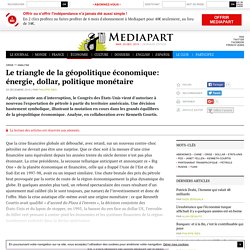
Que ce choc soit à la mesure d’une crise financière sans équivalent depuis les années trente du siècle dernier n’est pas plus étonnant. Brand New RWE Plant Is Latest Victim of Merkel's Energy Shift. Germany’s unprecedented energy shift is turning newly built power plants into white elephants that will never produce any electricity.
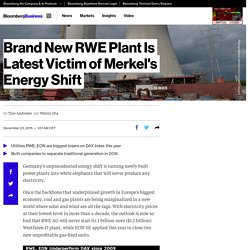
Once the backbone that underpinned growth in Europe’s biggest economy, coal and gas plants are being marginalized in a new world where solar and wind are all the rage. With electricity prices at their lowest level in more than a decade, the outlook is now so bad that RWE AG will never start its 1 billion-euro ($1.1 billion) Westfalen-D plant, while EON SE applied this year to close two new unprofitable gas-fired units. The plants show the struggle the nation’s biggest utilities are facing. Premières conséquences de la #COP21 ? Le cours en bourse de l'action Peabody (société de production de #charbon US). La consommation mondiale de charbon va fortement ralentir jusqu'en 2020.
Report: Removing #fossilfuel subsidies would slash emissions 11% within five years. Cooling Requirements and Water Use Impacts of Advanced Coal-fired Power Plants with CO2 Capture and Storage. In addition to the large cost impact that comes with including CO2 capture in coal power plants, the consumption of water also increases.

The increase in water consumption could represent a significant barrier to the implementation of CO2 capture. Although it is assumed that technology improvements might reduce the cost and power consumption of future CO2 capture systems, it might not be feasible to implement CO2 capture if additional water is not available at a site. In addition, because many regions of the world where coal is abundant are not blessed with abundant water resources, the additional water requirements of CO2 capture might inhibit the adoption of that technology in those regions. The report begins with a review of previous work that has examined the impact of CO2 capture systems on coal power plant water consumption.